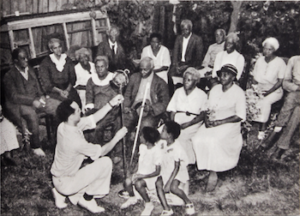
Rosco Lewis recording
*Slave Narratives: A Folk History of Slavery in the United States is celebrated on this date in 1937.
On that date, John Lomax, then a national advisor for the Federal Writers Project, drew up questions for field workers to use to capture enslaved Africans' oral histories in America. After 1916, The Journal of Negro History published articles that, in part, had to do with the African American experience of slavery (as opposed to the white view of it).
This resulted in several efforts to record the memories of living former enslaved individuals, especially as the number of survivors of the generation born into slavery before Emancipation in 1865 were declining. The earliest of these were two projects that began in 1929, one led by Charles S. Johnson at Fisk University and a second by John B. Cade at Southern University, called "Opinions Regarding Slavery - Slave Narratives."
In 1934, Lawrence D. Reddick, one of Johnson's students, proposed a federally-funded project to collect narratives from formerly enslaved individuals through the Federal Emergency Relief Administration, providing work opportunities for unemployed people as part of the first wave of New Deal funding. This program, however, still needed to achieve its goals, and several years passed before narratives began to be collected again. The folklore collections undertaken by Lomax more directly inspired Reddick's FWP slave narrative collection. Carolyn Dillard, director of the Georgia branch of the Writers' Project, pursued collecting stories from persons in the state who had been born into slavery. A parallel project was started in Florida with Lomax's participation, and the effort subsequently grew to cover all the southern states (except Louisiana) and several northern states.
In the end, Arkansas collected the largest volume of slave narratives of any state. Often referred to as the WPA Slave Narrative Collection, it is a collection of histories by formerly enslaved people undertaken by the Federal Writers' Project of the Works Progress Administration from 1936 to 1938. It was the simultaneous effort of state-level branches of FWP in seventeen states, working largely separately. FWP administrators sought to develop a new appreciation for the elements of American life from different backgrounds, including that from the last generation of formerly enslaved individuals. The collections of life histories and materials on African American life resulted in impetus to the collection.
The narratives and photographs in the collection are works of the U.S. federal government and are in the public domain. They have been digitized and are available online. Excerpts have also been published by various publishers as printed books or on the Internet. The collection contains over 10,000 typed pages, representing more than 2,000 interviews. The Library of Congress in Washington, D.C., also has a digitized collection of audio recordings sometimes made during these interviews.